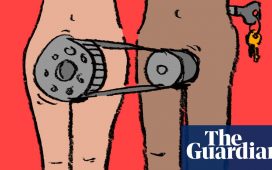There is a moment early on in the film Marriage Story, Noah Baumbach’s Oscar-nominated exploration of divorce, that sparked rueful recognition from Tom Kretchmar, a divorce lawyer. “Right at the outset, the actors Adam Driver and Scarlett Johansson are like: ‘What’s there to fight about? This is going to be easy – we’ll take half each and go our separate ways.’”
The naivety of that assumption is revealed after the couple lawyer up. They eventually find themselves in a courtroom, side by side but never further apart, wondering what had happened to their amicable split. Thought to be inspired by Baumbach’s split from Jennifer Jason Leigh in 2013, the film has won widespread acclaim for its depiction of the end of a marriage.
As a lawyer at Chemtob Moss Forman & Beyda in New York, Kretchmar has overseen the end of a lot of marriages. He says he found much of Marriage Story – some technicalities aside – to be “stunningly on-point”. There are lessons in the film for any couple setting out to sever ties, he says, chief among them: even if yours is truly an amicable divorce (“that absolutely happens”), once the process of working out rights and obligations begins, “it goes in a very different direction … All it takes is one side thinking the other side has ‘broken the deal’, so to speak, and is acting in bad faith, and the wheels can come off very quickly.”
When 33-year-old Claire, from Glasgow, separated from her husband in early 2018 after a six-year relationship, she did not want the “horrendous” divorce her parents had had. “I was determined that our split would be different,” she says. It was her decision to end the marriage, but as her husband had acknowledged their issues, she had assumed that they would be able to remain civil and ultimately co-parent their six-year-old daughter together.
“Shortly after, it became clear that the narrative on his side had changed completely and I ‘had left’ him, and ‘our daughter wouldn’t grow up in our beautiful house’ because of my decision. Naively, I hadn’t expected this, as he had openly talked about our difficulties.”
Rakhi Singal, head of family law and founder of RVS Solicitors in London, says: “No one really goes in with the right knowledge when they start a divorce. They think it will be quite straightforward – but it never is.” She advises spouses who want to split to involve lawyers as soon as possible, lest they make promises to one another that they will later be advised not to keep.
The initial approach must be carefully handled, so that the first lawyer’s letter doesn’t land as a shock. “It puts the other party’s back up. They feel like they’re being attacked. … Both parties need to feel involved in the process equally,” says Singal.
Many people also misunderstand divorce to be a formal airing of grievances, although these are rarely relevant. “I’m not really interested in arguments a client had with their partner 20 years ago, because the judge won’t be interested either,” says Andrew Perryman, a specialist family law solicitor and partner at Rose & Rose in London. Under both English and Scots law, individuals must prove the “irretrievable breakdown” of a marriage with evidence of “unreasonable behaviour”, adultery, desertion (not in Scotland) and/or years-long separation. Perryman sees many couples fall into the trap of arguing over “a subjective view of why the marriage broke down … which is an almost meaningless procedure” that will most likely have no bearing on the outcome when it comes to finances or custody. “It’s a rich man’s game, contesting divorce proceedings. Your best bet is to save your money for a sensible argument as to how assets are divided up.”
“People just want to win,” says Singal. But it is their lawyer’s job to focus them on the substantive issues and to “take the fire out of the whole situation” – although some, she concedes, seem to delight in throwing paraffin. “I have some clients transfer over from other firms and they say: ‘We’re just not spoken to as humans.’” But often clients’ expectations need to be managed, says Kretchmar. “Every divorce lawyer will tell you that they’re treated like a therapist.”
There are in fact a minimum of four egos at the negotiating table, as the rogue’s gallery of attorneys in Marriage Story goes to show. Laura Dern steals the show as Johansson’s cut-throat, showy counsel Nora Fanshaw – reportedly based on Laura Wasser, the real-life celebrity “Disso [as in “dissolution”] Queen” who represented Jason Leigh in her divorce from Baumbach (and who has praised the film as “very, very accurate”).
It is easy to blame lawyers, says Kretchmar, particularly if the process is unfolding counter to expectations – but those were likely unrealistic or uninformed from the start. “The truth is, more often than not, that change in position is coming from the spouse. People hide their true intentions behind their lawyer all the time. Frankly, that’s part of what they’re paying for.”
Jonathan, a 63-year-old Londoner, estimates that he has already spent £12,000 on legal fees in attempting to end his marriage of 24 years, at his wife’s instigation. She has refused requests for mediation; they are awaiting their second hearing. “I have found the process time-consuming, wasteful, expensive, traumatic and adversarial, including with my own lawyers,” says Jonathan. “My advice to anyone would be along the lines of ‘don’t bother to get married’.”
But those in unhappy marriages should not be discouraged from ending them by the fear of a legal fight, says Steve Kane, an entrepreneur and the author of F… It. Get a Divorce: The Guide for Optimists. “There is still some social stigma to divorce, so people linger in sometimes torturous relationships. In a world where we can forgive ourselves for needing to move on from a marriage, it’s a tiny, tiny additional step to forgive your spouse.”
In the UK, the blame game will be alleviated by the introduction of “no-fault divorce”. The proposed law is in a bill before parliament and will, the government promises, speed up the process and remove “needless antagonism”.
At present, in English law, even the smoothest, speediest route usually requires two years of separation (if both parties consent; five years if they don’t. In Scotland, the requirement is one and two years respectively). Simon Blain, a family law partner at Forsters, says this “throws people off balance quite early on … I don’t think people understand how intertwined your lives become as a married couple, and how hard it is unpacking those arrangements.”
Rachel, 42, from Staffordshire, remembers having to keep track of the date she officially separated from her spouse before their divorce was finalised in 2012 – “not the nicest thing to have on your calendar … The whole thing seemed designed to be miserable and difficult. By the end of it, we were still friends-ish, but I think our friendship would have survived in a more robust way if we had been done and dusted quickly.”
Claire’s divorce was finalised only this month, after what she characterises as a “20-month emotional meltdown” from her newly ex-husband. The work of moving on from the marriage is ongoing; she is seeing a counsellor. Claire saw Marriage Story, but “didn’t love it”, she says. “Maybe the subject matter is too close to the bone for me at the moment. I did envy the scene where they let rip at each other, as I never really had that moment of catharsis with my ex and now probably never will.”
Some names have been changed














